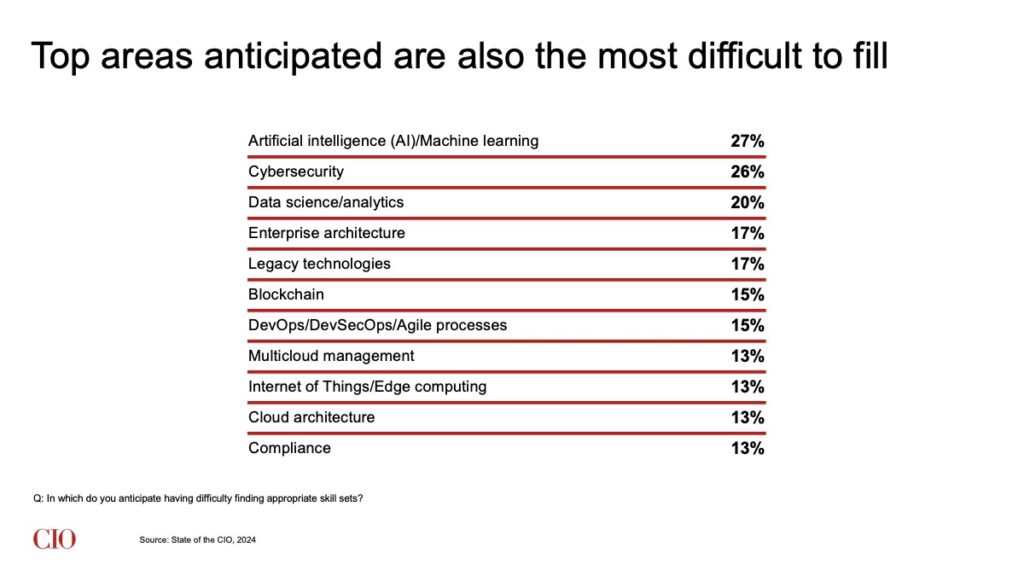How CIOs Transformed into Strategic Talent Leaders in the Digital Transformation Landscape

The role of the Chief Information Officer (CIO) has evolved significantly in the era of artificial intelligence (AI) and machine learning (ML). A big component of today’s CIOs role is playing a crucial role in shaping the human capital composition of their organizations for the digital future. This transformation is highlighted in the “State of the CIO, 2024” report, which emphasizes the critical importance of attracting and cultivating a workforce skilled in frontier technologies, with AI/ML being the most sought-after skill at 27%.
Organizations are no longer monolithic entities, but rather adaptive algorithms that learn and evolve. To thrive, they require a talent pool that mirrors this agility. However, the talent landscape presents a complex optimization problem. While AI/ML is crucial, cybersecurity (26%), data science (20%), legacy technology veterans (17%), enterprise architects (17%), and even niche areas like blockchain (15%), DevOps (15%), multicloud management (13%), Internet of Things/edge computing (13%), and cloud architecture (13%) hold strategic value.
The challenge lies not just in identifying these skill sets but in aligning them for optimal performance. The report acknowledges the looming roadblock – a scarcity of qualified talent, particularly in AI/ML (27%), cybersecurity (26%), and data science (20%). To address this, CIOs are forging partnerships with universities to bridge the skills gap, fostering programs that align curriculum with industry needs. Additionally, building a diverse talent pipeline and fostering an inclusive workplace culture become essential to attract a broader range of potential hires.
The most intriguing solution, however, lies in internal optimization. By leveraging data and analytics, CIOs can identify upskilling opportunities within their existing workforce. This talent “reshuffling” could involve targeted training programs or internal mentorship initiatives, transforming current employees into the future-proof workforce they seek.
Key Skill Areas
AI/Machine Learning (27%)
Expertise in artificial intelligence and machine learning remains the most sought-after skill, underscoring the need for capabilities that drive innovation, enhance customer engagement, and optimize operational processes. CIOs are not only looking to hire external talent but also investing heavily in upskilling programs to cultivate these skills internally.
Cybersecurity (26%)
With the increasing prevalence of cyber threats, skills in cybersecurity are more crucial than ever. CIOs are actively seeking professionals who can develop advanced threat detection systems, manage risk, and ensure compliance with evolving regulations, thereby safeguarding organizational assets and maintaining trust.
Data Science/Analytics (20%)
The ability to analyze and leverage data effectively provides a competitive edge, making data science and analytics expertise essential. CIOs require teams that can extract actionable insights from complex datasets, informing strategic decisions and driving business growth.
Enterprise Architecture (17%) and Legacy Technologies (17%)
Mastery in enterprise architecture is vital for designing systems that support business strategies, whereas expertise in legacy technologies remains critical for ensuring the seamless integration and modernization of existing systems.
Blockchain (15%)
As blockchain technology finds more applications beyond cryptocurrencies, such as in supply chain transparency and smart contracts, CIOs are increasingly in need of professionals who can pioneer these initiatives.
DevOps/DevSecOps/Agile Processes (15%)
Agile methodologies and DevOps practices are transforming the speed and efficiency of software development and operations. Skills in these areas enable organizations to be more adaptive and responsive to market changes.
Multicloud Management (13%), Internet of Things/Edge Computing (13%), and Cloud Architecture (13%)
These competencies are essential as organizations increasingly rely on distributed computing environments. Skills in managing multiple cloud services, deploying IoT devices, and designing cloud infrastructure are critical to enhancing operational efficiency and fostering innovation.
Compliance (13%)
With regulatory frameworks constantly evolving, expertise in compliance ensures that organizations meet legal and ethical standards, which is pivotal in maintaining operational legitimacy and protecting customer data.
In conclusion, the CIO’s role has transcended technology leadership. They are now strategic leaders who play a crucial role in shaping the human capital composition of their organizations for the digital future. By bridging the talent gap through strategic acquisition, internal development, and fostering a culture of continuous learning, CIOs ensure their organizations remain not just competitive, but at the forefront of the digital revolution.
Sources:
- State of the CIO, 2024: Change makers in the business spotlight
- Gartner Survey of Over 2,400 CIOs Reveals That 45% of CIOs are Driving ….
- What is the CIOs Role in Digital Transformation?
- How CIOs reinterpret their role through AI | CIO
- Navigating the Future: CIO Challenges in 2024 – CIO Chronicle
- Gartner Unveils Top Eight Cybersecurity Predictions for 2024
- Future Insights: CIO And CX Predictions For 2024 And Beyond – Forbes
- To Make Unions Resonate Again, Study the CIO’s History
- Angela Miller-May’s Long Road to the CIO Seat
- State of the CIO 2024 – CIO Council of South Florida
- The CIO’s 2024 AI playbook
- 80% of IT leaders to increase AI/ML involvement in 2024
- Logicalis 2024 CIO Report: AI and Security are Top Priorities for ….
- 3 key digital transformation priorities for 2024 | CIO
- 10 top priorities for CIOs in 2024 | CIO
- What it takes to land a CIO gig in 2024 | CIO
- The top talent acquisition trends in 2024 | McKinsey
- Talent Acquisition Trends in 2024: Embracing AI for Success
- Analysts unpack key recruiting trends impacting 2024 | iCIMS
- Top 5 trends for AI hiring solutions for 2024 – ET CIO

